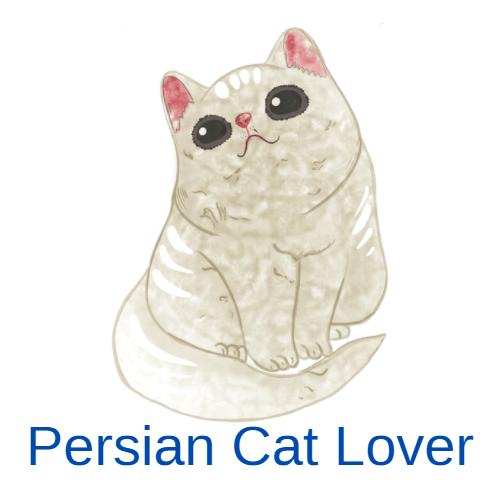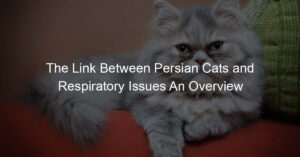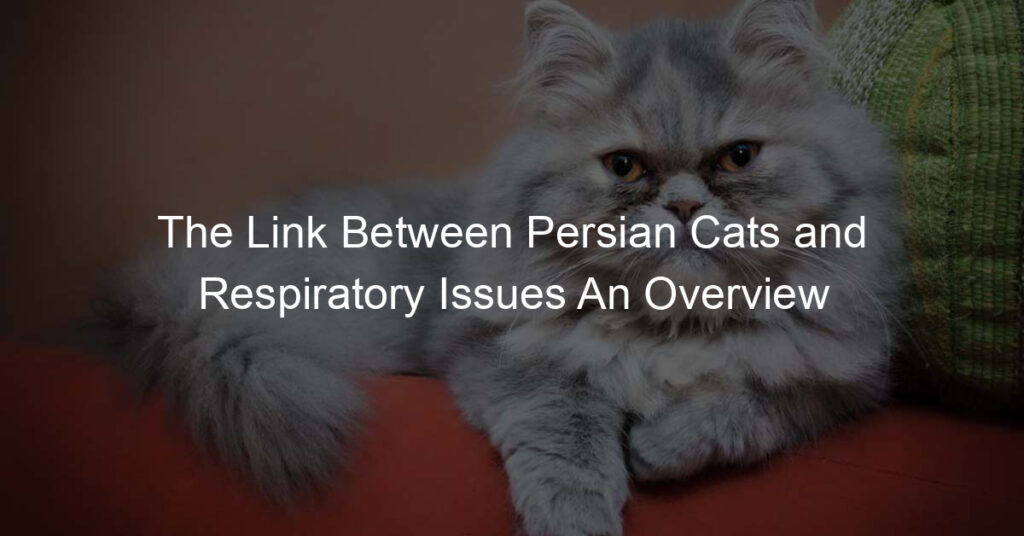People often ask if Persian cats are hypoallergenic. Unfortunately, the answer is more complex than a simple yes or no.
Persian cats do produce allergens, but the amount and type of allergen they have to vary from cat to cat. Allergies can be triggered by different proteins found in cats’ fur, saliva, and dander, so it’s important to note that no two cats are exactly alike regarding allergies.
If you suffer from allergies, there are some steps you can take to reduce your chances of an allergic reaction when considering bringing home a Persian kitty.
Vaccinating your cat regularly will help ensure that he does not carry any diseases that may exacerbate your allergies.
What Makes a Persian Cat Hypoallergenic?
Persian cats have been beloved by cat lovers for centuries and are known for their luxurious fur and beautiful appearance.
But did you know that they can also be hypoallergenic? That’s right. Certain Persian cats may help reduce the symptoms of allergies in people who suffer from them. So what exactly makes a Persian cat hypoallergenic?
One factor is the breed itself. For example, some breeds of cats produce less dander (the allergen found in cat saliva) than others, making them more suitable for allergy-prone people.
Persian cats typically belong to this category, meaning they may not trigger the same allergic reactions as other breeds do. This is because their long coats trap fewer allergens and prevent them from being released into the air.
The environment a Persian cat is kept in can also play an essential role in whether or not it is hypoallergenic.
Is There Any Way To Reduce Symptoms if I Am Allergic to Cats?
If you’re allergic to cats but can’t bear to part with your feline friend, there are some steps you can take to reduce symptoms.
Persian cats are considered hypoallergenic because they produce fewer allergens than other breeds. Regular grooming and bathing can also help reduce dander and saliva proteins in the air, which cause allergic reactions.
To further reduce symptoms, keep your cat out of the bedroom or any other area where you spend a lot of time. Vacuuming and washing bedding regularly, as well as using high-efficiency particulate air (HEPA) filters throughout the house, can also be effective in reducing allergen exposure.
Despite these strategies, however, it is still possible for sensitive individuals to experience allergic reactions due to their contact with cats. If you have concerns, speak with your doctor about planning a course of treatment.
With proper management, it is still possible to enjoy the companionship of a Persian cat despite allergies. Allergies can be managed if you take the right precautions and remain aware of any potential triggers that may flare up symptoms.
How Can I Tell if My Persian Cat Is Causing Allergies?
There are several ways to tell if your Persian cat is causing allergies.
First, take note of symptoms that you may be experiencing when around the cat. Common allergic reactions include sneezing, wheezing, itchy and watery eyes, runny nose, and skin rash or hives.
If you start to experience any of these symptoms after spending time with your Persian cat, it may indicate that you’re allergic.
Another way to determine whether your Persian cat is causing allergies is to evaluate its fur type. Persian cats usually have long, thick fur, which can contribute significantly to indoor allergen levels.
If the fur is especially long and fluffy, then this increases the chances of triggering allergies even further. To test this, you can try bathing and grooming your cat more regularly. This should help reduce the number of allergens present in its fur.
Finally, if you’re still unsure whether your Persian cat is causing allergies, then it might be worth consulting an allergy specialist or trying out a hypoallergenic diet for your pet.
A hypoallergenic diet is explicitly designed to reduce allergen exposure while providing necessary nutrition to cats. If this diet helps alleviate symptoms, then it could suggest that your Persian cat is indeed the source of your allergic reactions.
How Often Should I Groom My Persian Cat To Reduce Allergies?
If you’re wondering how often you should groom your Persian cat to reduce allergies, the answer may surprise you. As it turns out, Persian cats don’t require any more grooming than other breeds.
They are quite low-maintenance when it comes to grooming and can even be bathed just once a month!
That said, regular brushing is still essential for all cats. Not only does this help keep their fur healthy and free of mats or tangles, but it also helps remove excess dander, which can trigger allergic reactions in some people.
So even if you don’t have an allergy to cats yourself, brushing your Persian cat regularly will help ensure that your visitors aren’t affected by allergens in the house.
Regarding the frequency of brushing, this will depend on your cat’s individual needs and breed and coat type. For example, long-haired breeds like Persians will generally require more frequent brushing than short-haired cats.
If your Persian has an exceptionally long coat, you should brush them every other day or at least several times a week.
In addition to regular brushing, periodic grooming with a detangling comb or undercoat rake can help remove excess fur and reduce shedding, which in turn reduces allergens in the home.
It’s also important to bathe your Persian cat regularly; however, take care not to overdo it since too many baths can dry out their skin and lead to increased shedding.
Finally, keep an eye on your cat’s nails and ensure they’re trimmed regularly (about once a month). Long nails can snag on carpets and fabrics, creating more allergens, so it’s essential to trim them down to a safe length.
Does Feeding Persian Cats Certain Foods Reduce Allergen Production in Their Fur and Dander?
Persian cats are famous among those with allergies but still produce allergens that can trigger symptoms. So to ease the discomfort of those living with these beautiful creatures, some owners are turning to special diets for their Persian cats.
Proponents claim that a diet rich in omega-3 fatty acids and other beneficial nutrients can reduce allergens found in fur and dander. But is there any scientific evidence to support this?
A study published in 2011 looked into the effects of dietary supplements on cat allergen production. The researchers tested the effects of various diets on indoor cats, including one group that was given a supplement containing royal jelly, omega-3 fatty acids, thymol, and eucalyptus oil.
After 12 weeks, the cats given the supplement had lower levels of Fel d 1 allergen in their fur and saliva than the control group.
The results suggest that dietary supplements may reduce allergen production in Persian cats, but more research is needed to confirm these findings.
In addition, owners need to understand that these supplements cannot replace regular grooming and other allergy-control measures.
Regularly brushing and bathing your cat can help reduce allergens in the home, so it’s still essential to follow a consistent grooming routine even if you supplement your cat’s diet.
Some evidence suggests that specific diets can help minimize allergen production in Persian cats, though further research is needed to confirm these findings. Until then, owners must keep their cats clean and well-groomed to reduce allergens in the home.














